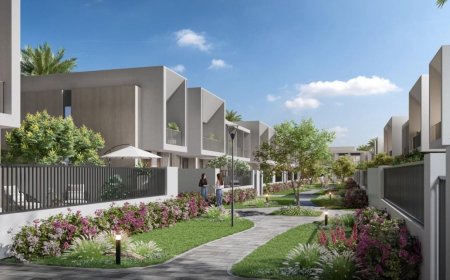Residential Programs for Adults with Autism: Comprehensive Support and Services Overview
Residential programs for adults with autism provide structured environments where individuals can receive tailored support to live more independently and improve daily living skills. These programs offer varying levels of care, from group homes to supported living arrangements, based on individual needs.

Residential programs for adults with autism provide structured environments where individuals can receive tailored support to live more independently and improve daily living skills. These programs offer varying levels of care, from group homes to supported living arrangements, based on individual needs.Such programs focus on enhancing communication, social skills, and self-care while promoting personal growth and community integration. They often include occupational therapy, life skills training, and personalized assistance, helping adults with autism achieve a better quality of life.Adults with autism may require different types of support depending on their abilities and challenges. Residential options adapt to these differences, providing a safe and supportive setting that fosters independence while addressing unique needs.
Types of Residential Programs for Adults With Autism
Residential programs vary in the level of support and independence they provide. They are designed to meet diverse needs, from intensive daily assistance to more autonomous living with occasional support. Each program type offers distinct structures and resources based on individual capabilities and preferences.
Group Homes
Group homes are residential settings where a small number of adults with autism live together. Staff provide daily support, including help with personal care, meal preparation, and community engagement.These homes offer a balance of supervision and social interaction, fostering independence while ensuring safety. Group homes usually have 4 to 8 residents, allowing for individualized attention within a communal environment.Staffing is often available 24/7, tailored to residents needs. This setting suits individuals requiring moderate to high levels of support but who can benefit from shared living and social opportunities.
Supported Living Arrangements
Supported living arrangements enable adults with autism to live in their own or shared apartments with staff assistance. Support may range from a few hours weekly to daily visits, depending on the individuals needs.This model emphasizes independence, allowing residents to maintain more control over their routines and environments. Assistance can include help with budgeting, transportation, job coaching, and household management.Supported living is ideal for individuals who can perform many tasks independently but benefit from targeted support. It promotes skill development and community participation while providing safety nets.
Assisted Living Facilities
Assisted living facilities offer residential care combined with medical and therapeutic services. They provide structured support for adults with autism who have complex health or behavioral needs.These facilities have licensed professionals on-site to address medical monitoring, therapy, and crisis intervention. Residents receive assistance with daily activities like medication management, meals, and personal care.This program suits individuals requiring more intensive support than group homes or supported living can provide. The environment balances care needs with opportunities for socialization within a secure setting.
Specialized Housing Solutions
Specialized housing solutions involve tailored living environments designed specifically for adults with autism. They combine customized support with innovative design to meet sensory, cognitive, and social needs.These programs often include noise reduction features, clear spatial organization, and technology that supports communication and independence. Services are highly individualized, focusing on maximizing quality of life.Specialized housing can include developments like neurodiversity-focused communities or homes linked to day programs offering comprehensive therapeutic services. They fit adults seeking environments that address unique challenges and preferences.
Choosing and Accessing Programs for Adults With Autism
Selecting a residential program requires understanding eligibility, financial resources, and how care is coordinated. Each aspect influences the suitability of a program and the quality of support an individual receives.
Eligibility and Admission Criteria
Eligibility criteria vary widely between programs. Common factors include age, diagnosis confirmation of autism spectrum disorder, level of support needed, and behavioral considerations.Some programs prioritize individuals with severe autism or additional medical needs. Others may be designed specifically for younger adults transitioning from pediatric services or older adults seeking a change.Admission often involves assessments, interviews, and medical evaluations to determine the best fit. Waiting lists are common due to high demand, so early application and gathering necessary documentation are essential.Programs may also require prospective residents to meet certain independence or communication standards. Family input and clinical recommendations usually play a key role in the admission decision.
Funding Options and Financial Assistance
Funding for residential programs comes from various sources such as government waivers, Medicaid, private insurance, and personal or family funds.Medicaid waivers often cover supported living and group home services. Eligibility for these funds is usually income-based and may require individuals to apply through state agencies.Private insurance might cover specific therapies but less often covers residential living directly. Some nonprofits offer grants or subsidies for qualifying individuals.Families should explore all available financial options and consider financial planning services. Understanding coverage limitations and application processes helps avoid surprises.Programs frequently provide guidance on funding navigation. Coordinating multiple funding streams can increase access to higher-quality services.
Care Coordination and Family Involvement
Effective residential programs emphasize coordinated care among medical professionals, therapists, and support staff. This ensures comprehensive management of health and behavioral needs.Families are often invited to participate in care planning and ongoing communication to support continuity between home and program settings.Some programs offer regular updates, family meetings, and inclusion in decision-making about goals and services. This involvement supports better outcomes and personalized care.Collaboration with external providers, such as primary care doctors or specialists, is vital. Strong family involvement helps adapt services as needs evolve.Programs that foster open, consistent communication contribute to resident well-being and satisfaction.





























